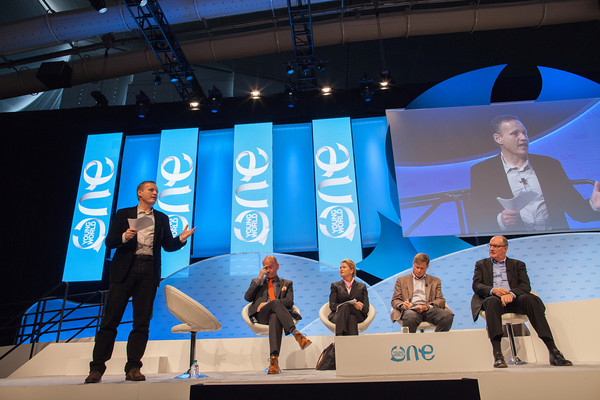[[[image-0 large]]]
One Young World Returning Ambassador Raymond Farnan reports on the Ethical Business Special Session.
Ethical business
In this session Anthony Jenkins (AJ), introduced by returning ambassadors Lawrence Gaston (Barclays) and Charlotte Murray (Aviva), hosted a panel to discuss the concept of ethical business. The panel was made up by Neil Golightly - Shell (NG), Will Hutton - expert commentator (WH), Sabine Zindera - Siemens (SZ) and Doug Richards - founder of school for start ups (DR).
Anthony returns to OYW this year as global CEO of Barclays having given a fantastic speech at the 2011 OYW event in Zurich. In 2011 he spoke of a shareholder value maximisation model that embraced a long term view of value maximisation, incorporating some of the illuminating principles of Michael Jensen's enlightened stakeholder theory. Anthony believes that in striving for maximised shareholder value, a long term view on "value" means that companies will have regard and will show responsibility for all of their stakeholders, thus creating an ethical business model.
After a video showing examples of the breakdown of trust between business and society in a number of countries, the ethical business panel served to reignite the debate on ethical business in the context of Anthony's previous presentation on the issue. It didn't disappoint, and went beyond the talks that have been given at previous summits by creating debate on a complex topic that is often misrepresented and lacks clarity when discussed. Key highlights of the views expressed in the debate included:
* Sabine Zindera: Rebuilding trust takes time, and there are no quick solutions to convincing stakeholders that you are genuinely ethical. The only solution is to be genuine and take ethical action. If you do, there are so many positives, and this has been shown in the time after the corruption scandal that hit Siemens a number of years ago.
* Will Hutton: As innovative and great as business is, in recent years it hasn't focused on being inventive to tackle long term problems in society and has been too focused on short term financial gains.
* Niel Golightly: Corporations have a role to organise around big problems to provide solutions; bottom line profit is the enabler rather than the end in itself.
* Doug Richard: Milton Friedman was wrong, business for business is not business, instead there needs to be a purpose. Most of the time people start companies to achieve something, to solve a problem, not purely to make money. On a separate but connected point, corporations have been given humanity, with limited liability, the opportunity to donate to political causes and have a view, but with that we need to ensure that they are accountable just like humans.
* Antony Jenkins: It is important to understand how to help companies take a long term view and embed a culture of ethical business within their organisation - that is the real challenge. If companies focus on short term profit they will not be pursuing true shareholder value and optimising all stakeholder relationships.
* DR: Capitalism is selfish, but there is nothing wrong with being selfish if it produces the correct result, enlightened self interest is the way to progress to ethical business which accepts human nature but puts the correct framework in place in markets to ensure a great end result.
* WH: The design of markets is crucial, rules are necessary, and if you look at the light hearted example of American football, great prosperity and competition can come with the right framework of rules and incentives.
* DR: Linking back to Anthony's 2011 speech, Doug Richards explained that in holding companies accountable and achieving real transparency to drive the consideration of all stakeholders with a long term focus, it was vital that companies report and are effectively compared on issues such as environment and social impact beyond financial data.
David Jones added that in his view ethical businesses would increasingly be the successful businesses going forwards. David's opinion encouragingly suggests that more and more businesses will be taking a longer term view on maximising shareholder value in a way that values all stakeholders and their well being in the long term which is ultimately the aim of an ethical business.
The output to the work AJ has done with 10 UK ambassadors is to ensure as many corporations as possible being engaged in #glass table conversations#. OYW delegates were charged with challenging their business to have transparent conversations after this years summit so that we can report back with positive action in Johannesberg. The three objectives of these conversations to promote ethical business are i) define and understand the long term purpose of the business ii) establish ways to effectively communicate this internally and externally iii) ensure that the business holds itself accountable through a transparent relationship with stakeholders.
Tough challenge. Arguably the most important challenge in the next 20 years. Great session.
